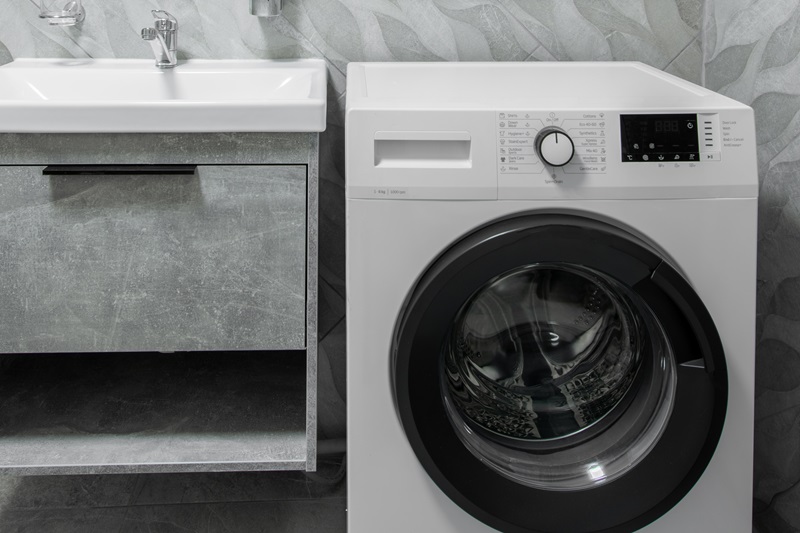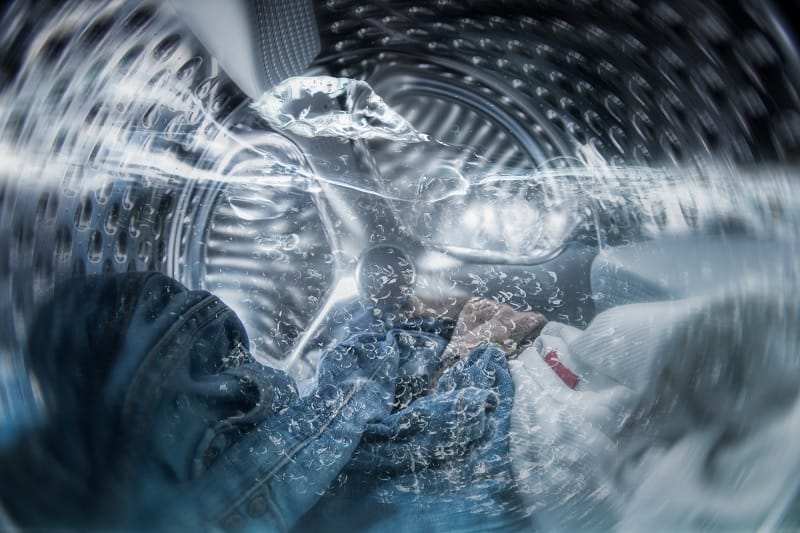If you’re in the market for a new washer, you might have come across inverter washing machines.
These washers stand out as a “smart” laundry solution that promises energy-efficient laundering without compromising performance.
But what exactly is an inverter washing machine?
In this article, we unravel the basics of this advanced technology appliance, exploring how its motor works and the unique benefits that this high-tech motor brings.
We also look at potential drawbacks, comparisons with standard washers, and considerations to help you decide whether to splurge on an inverter washing machine or not.
What Is an Inverter Washing Machine?
An inverter washing machine is a type of washing machine that incorporates inverter technology in its motor system.
If you’re not into electronics, this may sound a little confusing. However, it’s relatively straightforward to understand when you compare an inverter washing machine to a standard washer.
- In traditional washing machines, the motor runs at a fixed speed. The machine controls the washing process by turning the motor on and off rather than fine-tuning the velocity.
- An inverter washing machine uses “variable frequency drive technology” to control the speed of the motor more efficiently, turning the speed up or down as needed.
An inverter washing machine decides the speed to spin based on the size of the laundry load. The fewer clothes you put into the drum, the slower the motor turns.
In comparison, larger loads of laundry equal faster spin speeds. This means you can use less energy for smaller loads without compromising on performance.
What Are the Benefits of Smart Inverter Washing Machines?
You might wonder if inverter washing machines are superior to standard washers. This intelligent technology certainly comes with benefits in terms of energy efficiency, operational noise, and reductions in damage to your clothes and the appliance itself.
Let’s take a closer look.
1. More energy efficient
Inverter washing machines are generally more energy-efficient appliances compared to traditional washers.
The ability to adjust the motor speed means that the machine can use just enough energy to meet the current washing requirements, leading to potential energy savings for smaller loads.
The cost of running a washing machine in the UK can soon rack up, especially if you have a large family and need to do frequent washes.
Therefore, although inverter washing machines are more expensive than standard ones, they will likely save you money on laundry in the long run.
2. Quieter
The variable speed motor in inverter washing machines also often results in quieter operation.
Traditional washing machines with fixed-speed motors may produce more noise, especially during high-speed spin cycles with sudden stops and starts.
In comparison, inverter motors adjust their speed to match the load and washing conditions, reducing the need for sudden changes in speed.
This flexibility in motor speed, with its softer stops and starts, helps minimise vibrations – a significant noise source in washing machines.
3. Gentler on clothes
The variable speed operation of inverter washing machines allows for gentler washing, particularly during low-speed cycles.
This can be beneficial for delicate fabrics. The motor can run at lower speeds, reducing the mechanical stress on clothes to minimise wear and tear.
Additionally, traditional washing machines with fixed-speed motors often rely on a set pattern of agitation to clean clothes.
Inverter washing machines provide a more customised experience by adjusting the intensity of the agitation based on the specific requirements of the load.
4. Longer lifespan
Inverter technology contributes to the overall durability of a washing machine.
Firstly, the variable speed operation reduces stress on the motor, meaning it lasts longer before showing signs of wear.
The motor also gradually changes speed, minimising mechanical stress and sudden movements.
In some cases, inverter motors also have fewer mechanical parts compared to traditional motors.
This can contribute to increased durability and reliability, as there are fewer components that may wear out or require maintenance.
Overall, the appliances tend to last longer than traditional washing machines.
What Are the Disadvantages of Inverter Washing Machines?
While inverter washing machines have several advantages, they also have disadvantages. It’s important to note that the specific drawbacks can vary between models and brands, but here are the general drawbacks to be aware of.
1. Higher initial cost
Inverter washing machines are often more expensive upfront compared to traditional washing machines.
The smart motor technology and additional features contribute to the higher initial cost. You’re gaining access to more advanced technology, hence the higher price tag.
However, it’s worth considering the potential long-term energy savings and increased durability that may offset this initial expense.
You save money with every wash, won’t need to spend as much on repairs, and won’t need to replace your washer as frequently.
2. More complex
Inverter washing machines have more complex electronic components compared to traditional machines.
While this contributes to their efficiency, it can also mean that repairs may be more intricate and potentially more expensive. In some cases, specialised technicians may be required.
The electronic components in inverter washing machines can also be more sensitive to power fluctuations or surges.
In regions with unstable power supplies, the electronic control systems may be more susceptible to damage. Using surge protectors or voltage stabilisers can help mitigate this risk.
3. Still produce noise
While inverter washing machines are generally quieter than standard washers, there can be variations in noise levels depending on the specific model and brand.
Some users have reported that certain cycles or conditions may still produce noticeable noise.
With that said, the noise produced is often less than what is experienced with traditional washing machines on the same washing cycles and programs.
If noise is an essential factor for you when choosing an appliance, see our guide to the quietest washing machines.
Is an Inverter Washing Machine Better?
Whether an inverter washing machine is better than a standard washer depends on your preferences, priorities, and specific requirements. Both types of washing machines have their advantages and disadvantages.
Here are some considerations to help you choose the best washing machine for your needs:
- Initial budget: If upfront cost is a significant factor, a standard washer may be a more economical choice. You can buy budget washing machines for less than £300 in the United Kingdom, whereas inverter washers can cost upwards of £1,000.
- Energy efficiency: An inverter washing machine may be preferable if energy efficiency and potential long-term cost savings are priorities. You can save money with a traditional washer by using cooler temperatures, but this may impact efficiency and performance.
- Customisation: If you value the ability to customise wash settings and enjoy features like variable speeds, an inverter washing machine could be a better fit. It’s a must-have technology if you want to look after your clothes and extend their lifespan.
- Maintenance and repairs: Consider the complexity of the technology and potential maintenance needs. Inverter washing machines may have more sophisticated electronics, while standard washers may have simpler designs with fewer electronic components.
- Sensitivity to noise: If a quiet operation is crucial to you, inverter washing machines are generally the better option. However, standard washers with delayed start timers can be another way to keep noise down—simply do the laundry while you’re out of the house.
Ultimately, the “better” choice depends on your specific needs and preferences. Assess your priorities, compare features, read user reviews, and consider the long-term benefits to determine which type of washing machine aligns best with your requirements.

Hannah has a passion for cleaning. She worked her way around Australia by cleaning hostels in exchange for free accommodation and used her cleaning skills to bag a job as a chalet host for a luxury ski company in France.






